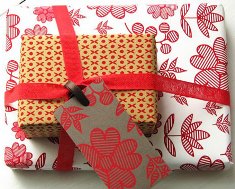Tackling Holiday Consumerism With Creative Resistance
by Jenny Blair | December 7, 2012

If a football player’s mettle is truly tested on a muddy field; if a gifted tailor can be judged by how he handles a complex repair; if a really good cook can improvise from a few ingredients, then a New Dreamer’s toughest challenge might be navigating the stuff-obsessed holidays.
Reminders to buy and attempts to get us in the mood are everywhere, from drugstore speakers to gimmicky billboards to e-mail exhortations to spend. How to resist?
Thoughtfully. There’s nothing intrinsically wrong with buying stuff. Our economy, at least for now, depends on it. But when buying becomes a capitalist sacrament, when every aspect of a special occasion has its de rigueur purchase, then it’s time to remember real values.
Contrary to the teachings of consumer culture, holiday purchases cannot be relied upon to create happiness, gratitude, a sense of the holy, a fresh start, or a feeling of community. In fact they may well erode these things. Yet it’s difficult to escape the pervasive and uneasy notion that we can buy our way into sacred experiences.
Critiques of this cultural message are probably as old as the message itself, but every age and every individual is different, and the solutions vary. How can we flex our New Dream muscle these days and meet holiday consumerism with creative resistance?
Here are some suggestions:
Look for craftspeople and artists
When you want to give things like tea towels or a blank book or a work of art, resist the ones at chains and big-box stores. Think about where your money will flow as you solve this particular gift problem. Do you want it to go to a giant corporation whose ownership is shadowy and whose policies you might not agree with, or would you rather patronize that phenomenal pillbug sculptor? Look for handmade goodies on Etsy.com, at a craft fair or farmer’s market, a church bazaar, or a locally owned business.
This year I visited an Austin shop that sells local elders’ crafts and bought clever combination spoon-forks that an old gent makes by welding spoon and fork ends together. Then I sewed little bags—“spork tubes”—for them, and set them aside to give to the hippies in the family. They can be to disposable utensils what Kleen Kanteens are to plastic water bottles. (Strictly speaking, these welded objects aren’t sporks. What they actually are has provoked serious discussion among my friends. Foons? Fpoons?) Color me smug, but doing this has been a lot of fun, and it feels like ethical gifting at its finest.
Wrap with care
I haven’t bought wrapping paper or bows in years. Switching to cloth seemed like pretty low-hanging fruit with regard to cutting down on trash. Gifts now get wrapped in gauze and calico and tied with ribbons or strips of gauze in a contrasting color; a sticker or the sprig of a dried plant provides a bit of decoration.
People are enchanted with the look of their gifts and have a good time untying everything, and I keep the cloth to use again another day. It takes about the same amount of time as paper wrapping, so you don’t have to get all Martha Stewart. Having said that, you could go all out. The Japanese are masters of cloth wrappings for just about any object, an art they call tsutsumi.
Try a white-elephant game
When my father’s extended family gets together, each of us brings something silly and inexpensive and puts it in a pile. Each of us chooses one, then we go around in a circle twice, each person getting a chance to trade for the gift of his choice. Laughter and mockery ensue, and the whole thing can serve as a powerful implicit criticism of the tradition of gift-giving and what it has devolved into.
The drawback: Few of us really like our gifts, which tend toward the stuffed monkey or Nixon mask, the sorts of things likely to get tossed. So do us one better. Think of a theme. Ask that people bring a kitchen tool (wooden spatula, ceramic saucer, powerful fridge magnet) or a $10 small-business gift certificate (bowling alley, chair-massage station, bookstore) or something that can be used to make something else (crochet hook + ball of yarn + simple pattern). Things like that get people thinking and may be what people actually want—or may at least suggest new experiences.
Speaking of experiences, they make great gifts...
...especially for people who “have it all.” My parents are impossible to shop for. On the other hand, they don’t get out much, so my sister and I have bought them tickets to local music performances. We once paid an artist to give them figure-drawing lessons, which went over well, as they’re both shy sketchers from way back.
My mother-in-law, a rough-and-ready outdoorswoman who loves animals, received as gifts a worm-compost kit one year and a beekeeper’s starter kit the next. She was thrilled, and months after most gifts would have gone on the shelf, she’s still spending quality time with her thriving worms and bees.
Consider forgoing gifts
My sister and I are very close, and each of us also moves often and travels light. So we have an old pact regarding obligatory gift-giving: we don’t do it. Neither of us needs more stuff, certainly not stuff received on some obligatory annual schedule. This loving exemption relieves us both.
We might spot optional surprises for each other at thrift shops, but we deliberately keep the stakes low and focus instead on having serious fun when we see each other. We're having too good a time baking and singing and square-dancing to be focused on any stuff we may have bought.
Jenny Blair is a writer, illustrator, and MD. Read more at her website jennyblair.com.

